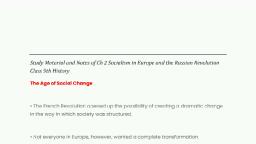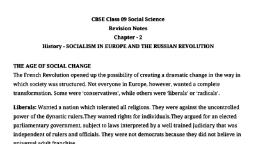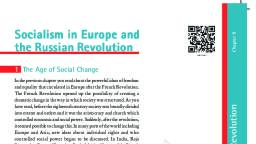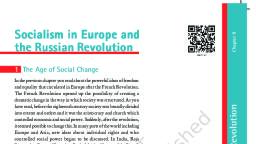Page 1 :
SOCIALISM IN EUROPE AND RUSSIAN REVOLUTION, THE AGE OF SOCIAL CHANGE
Page 2 :
Contents, The Age of Social Change, Liberals, Radicals and conservatives, Industrial Society and Social Change, The Coming of Socialism to Europe., Support for Socialism.
Page 3 :
The Age of Social Change, The French Revolution opened up the possibility of creating a dramatic changes in the way in which society was structured. , In many parts of the world including Asia and Europe new ideas about individual rights and who will controlled social power began to be discussed. , In India Raja Rammohan Roy and Derozio talked of the significance of the French Revolution, and many others debated the ideas of post revolutionary Europe. The developments in the colonies reshaped these ideas of societal changes.
Page 4 :
The Age of Social Change, Not everyone in Europe , however, wanted a complete transformation of society. Responses varied from those who accepted that some changes was necessary but wished for a gradual shift, to those who wanted to restructure society radically. Some were conservatives, others were liberals or radicals.
Page 5 :
Liberals, Liberals were one of the important group which looked to change society. They wanted:-, A nation which tolerated all religions., End of uncontrolled power of dynastic rulers., To safeguard the rights of individuals , A representative , elected parliamentary government, An independent judiciary , However they were not democrats. They did not believe in universal adult franchise.
Page 6 :
Radicals, In contrast, radicals wanted:-, A nation in which government was based on the majority of a country’s population., Women’s suffragette movements., To opposed the privileges of great landowners and wealthy factory owners., To opposed concentration of property in the hands of a few.
Page 7 :
conservatives, Conservatives opposed both radicals and liberals., In 18th century they generally opposed to the idea of change., By the 19t century they accepted that some changes was inevitable but believed that the past had to be respected and changes had to be brought about through a slow process, Such differing ideas about societal changes clashed during the social and political turmoil that followed the French Revolution.
Page 8 :
Industrial Society and Social Change, The new political trends were signs of a new time. It was a time when new cities came up and new industrialized regions developed, railways expanded and the Industrial Revolution occurred., Industrialization brought men, women and children to factories. , Work hours were often long and wages were poor., Unemployment was common during times of low demand for industrial goods., Housing and sanitation were problems., Liberals and Radicals searched for solutions for these issues.
Page 9 :
Industrial Society and Social Change, Liberals and radicals were often property owners and employers. They felt that trade or industrial ventures should be encouraged and its benefits would be achieved if the workforce in the economy was healthy and citizens were educated. , They firmly believed in the value of individual effort, labour and enterprise and would develop the societies., Many working men and women who wanted changes in the world rallied around liberal and radical groups and parties in the early 19th century.
Page 10 :
Industrial Society and Social Change, Some nationalists, liberals and radicals wanted revolutions to put an end the kind of government established in Europe in 1815. In France, Italy , Germany and Russia, they became revolutionaries and worked to over through existing monarchs. Nationalists talked of revolutions that would create nations where all citizens would have equal rights. After 1815, Mazzini, an Italian nationalists, conspired with others to achieve this in Italy.
Page 11 :
The Coming of Socialism to Europe, Perhaps one of the most far reaching visions of how society should be structured was socialism. By the mid-nineteenth century in Europe, socialism was a well-known body of ideas that attracted widespread attention., Socialists were against private property, and saw it as the root of all social ills of the time because the propertied were concerned only with personal gain and not with the welfare of those who made the property productive. So if society as a whole rather than single individuals controlled property, more attention would be paid to collective social interests. They wanted this change and campaigned for it.
Page 12 :
The Coming of Socialism to Europe, Socialists had different visions of the future. , Some believed in the idea of cooperatives. Robert Owen sought to build a cooperative community called New Harmony in Indiana(USA)., In France , Louis Blanc wanted the government to encourage cooperatives and replace capitalist enterprises. , These cooperatives were to be associations of people who produced goods together and divided the profit according to the work done by members.
Page 13 :
The Coming of Socialism to Europe, Karl Marx and Friedrich Engels added other ideas to this body of arguments. He argued that industrial society was capitalist. They owned the capital invested in factories., The conditions of workers could not improve as long as this profit was accumulated by private capitalists., Workers had to overthrow capitalism and the rule of private property and to construct a radically socialist society where all property was socially controlled. This would be a communist society., He was convinced that workers would triumph in their conflict with capitalist. A communist society was the natural society of the future.
Page 14 :
Support for Socialism, By the 1870s , socialist ideas spread through Europe. To coordinate their efforts, socialists formed an international body- namely the Second International., Workers in England and Germany began forming associations to fight for better living and working conditions. They set up funds to help members in times of distress, demanded a reduction of working ours and right to vote.
Page 15 :
Support for Socialism, In Germany they worked closely with the Social Democratic Party and helped it win parliamentary seats. , By 1905 socialists and trade unionists formed a Labour Party in Britain and a Socialist Party in France., However, till 1914, socialists never succeeded in forming a government in Europe.












































